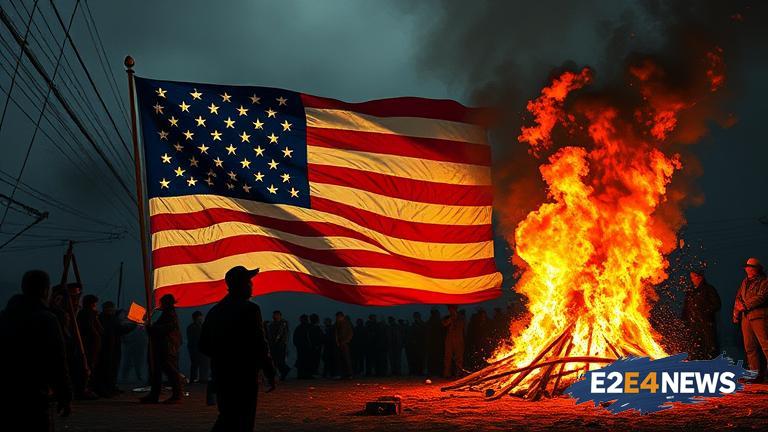President Trump has been making headlines with his recent executive orders, particularly those related to bail and flag burning. The orders, which have been met with widespread criticism, aim to restrict the rights of individuals accused of crimes and impose harsher penalties for those who desecrate the American flag. The bail order, in particular, has raised concerns among civil liberties groups, who argue that it disproportionately affects low-income individuals and communities of color. By limiting the ability of judges to grant bail, the order may lead to increased incarceration rates and further exacerbate the existing racial disparities in the justice system. Furthermore, the order’s emphasis on ‘public safety’ has been criticized as a thinly veiled attempt to justify the erosion of due process and the expansion of executive power. The flag burning order, on the other hand, has been denounced as a blatant attempt to suppress free speech and stifle dissent. The order’s language, which describes flag burning as a ‘despicable’ and ‘un-American’ act, has been seen as a clear attempt to intimidate and silence those who would dare to express dissenting views. Critics argue that the order is a clear violation of the First Amendment, which guarantees the right to free speech and peaceful protest. The orders have also sparked a heated debate about the limits of executive power and the role of the judiciary in checking the president’s authority. Many have argued that the orders are a clear overreach of the president’s constitutional powers and that they undermine the system of checks and balances that is fundamental to American democracy. The controversy surrounding the orders has also highlighted the deepening divisions within American society, with many on the right hailing the orders as a necessary measure to maintain law and order, while those on the left see them as a blatant attempt to undermine civil liberties and stifle dissent. As the debate rages on, it remains to be seen how the orders will be implemented and what impact they will have on the lives of Americans. One thing is certain, however: the controversy surrounding the orders has sparked a long-overdue conversation about the state of American democracy and the need to protect and preserve the fundamental rights and freedoms that are enshrined in the Constitution. The orders have also raised questions about the role of the media in holding those in power accountable and the need for a free and independent press to scrutinize the actions of the executive branch. In addition, the controversy has highlighted the importance of an informed and engaged citizenry, who are willing to stand up for their rights and challenge those in power when they overstep their authority. Ultimately, the fate of the orders will depend on the outcome of the ongoing legal challenges and the willingness of the American people to defend their rights and freedoms. The orders have also sparked a renewed interest in the history of executive power and the ways in which previous presidents have used their authority to shape the course of American history. As the country moves forward, it is clear that the controversy surrounding the orders will have far-reaching implications for the future of American democracy and the rights and freedoms of its citizens. The orders have also raised important questions about the relationship between the executive branch and the judiciary, and the need for a robust system of checks and balances to prevent the abuse of power. In conclusion, the controversy surrounding Trump’s executive orders on bail and flag burning is a complex and multifaceted issue that has sparked a heated debate about the state of American democracy and the need to protect and preserve the fundamental rights and freedoms that are enshrined in the Constitution.
